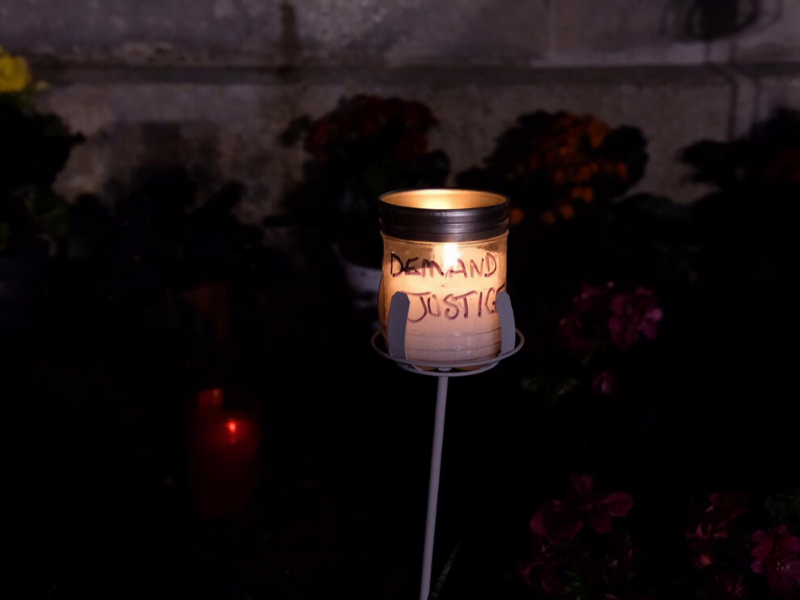The never-ending fight for justice for their mother Daphne Caruana Galizia, coupled with the State-sponsored harassment campaign against the family that depicted them as hell-bent on revenge against the country, was revealed by her three sons in an emotionally gripping podcast series investigating her murder.
The battle started right after Caruana Galizia was killed on 16 October 2017 in a car bomb when her husband Peter and her son Matthew had to run down to court to file a request to remove Magistrate Consuelo Scerri Herrera – who had previously sued the journalist for libel – from the role of inquiring magistrate investigating her assassination.
“Right after her murder, we had to start speaking up as the government was trying to spin it as inconsequential or that the investigation under control,” Matthew said in the third of a podcast series titled My Mother’s Murder. Written by his brother Paul, the four-part investigation is aired on investigative news portal Tortoise.
‘It filled us with fear’
The car bomb that killed Caruana Galizia was the sixth in two years – the previous five were all linked to criminal gangs and remain unsolved till this day.
“It filled us with fear. We knew the police had failed to solve a single one of the car bombings and that, coupled with our mistrust of the police, left us feeling dismayed,” Andrew said.
But something unexpected came their way.
“As a family, we had one stroke of luck early on. The FBI happened to be in Malta on a training exercise and, when they saw the assassination, they approached the police with an offer of help. The police couldn’t refuse and their involvement led to an unexpectedly early breakthrough in my mother’s case”.
One day in December 2017, Paul received a text message that arrests in connection to his mother’s murder were going to be made.
The Armed Forces of Malta had raided an abandoned potato shed in Marsa and three men – Vince Muscat and brothers Alfred and George Degiorgio.
Stephen Grey, a Reuter’s journalist, had followed the investigation of Caruana Galizia’s murder from the very start and pointed out that the three men were sloppy.
“They were somewhat naive – they must have been commissioned but made some pretty basic error that led themselves to be identified”.
The way the men executed the crime was “littered with basic errors” – the most crucial was that they used their burner phones and personal phones at the same spot. In a normal situation, this would have gone unnoticed by the Maltese police which did not have the technology to go through thousands and thousands of calls.
But the FBI did. They still could not understand the motive, which led to what Matthew described as “a sense of emptiness”.
‘Just like us, they didn’t know where to start’
The Guardian journalist Juliette Garside was one of the journalists who had started investigating the murder from the very start as part of The Daphne Project.
“Just like us, they didn’t know where to start,” Paul said.
The journalists divided up the work on a suspicious energy deal where Shell would sell gas to a company called Socar, which then sold it to Electrogas and then eventually sold it to the Maltese State.
The consortium had a cache given to Caruana Galizia that shed light on corruption in the deal that made Malta pay a fixed price that did not reflect the market value. “Socar was pocketing the difference and we had to see who was benefitting,” Garside said.
Reuters’ Stephen Grey started investigating Caruana Galizia’s cryptic blog post about 17 Black. “She said it’s how these crooks move money out of Dubai.”
The investigation took on a new life when the consortium got hold of new emails from Panama Papers. “We had documentary proof to show why it was important as it showed that the two people in the government who had Panama companies – Konrad Mizzi and Keith Schembri,” Grey said, pointing out that she had flagged these people as corrupt.
In the emails, discussions showed that they expected these two companies to be receiving money from two companies in Dubai – one of which was 17 Black. “I got a briefing from someone high ranking person in Europe who said: Keep going with what you are doing as our indication is that all this goes up to the top,” Grey said.
“Keep going with what you’re doing…this whole thing goes up to the top.” – a high ranking official in Europe, briefing journalist @StephenGrey.
Episode 3 of #MyMothersMurder is out now. #PanamaPapers
Listen here: https://t.co/XVYcivuUTc pic.twitter.com/5mxd3FCM1y
— Tortoise (@tortoise) February 20, 2020
The battle with the State
The family came head to head with the Maltese government. “Every one of our attempts to achieve justice was met with constant obstacles,” Paul said.
The government media was constantly portraying them a family bent on revenge against their own country. “The most painful battle we had to fight was the one on the PR front – Matthew was blamed for our mother’s assassination either because the car was parked outside – as if that…you know…,” Andrew said.
Paul describes every day after the December 2017 arrests as a fresh crisis for the family. He says that, at some point, he started to feel that the truth would never come out. But his brother Andrew disagreed.
“It comes to a point where the truth will just burst out as society will have to change too much to contain it,” Andrew said.
There’s more. Listen to the Tortoise podcast here.













